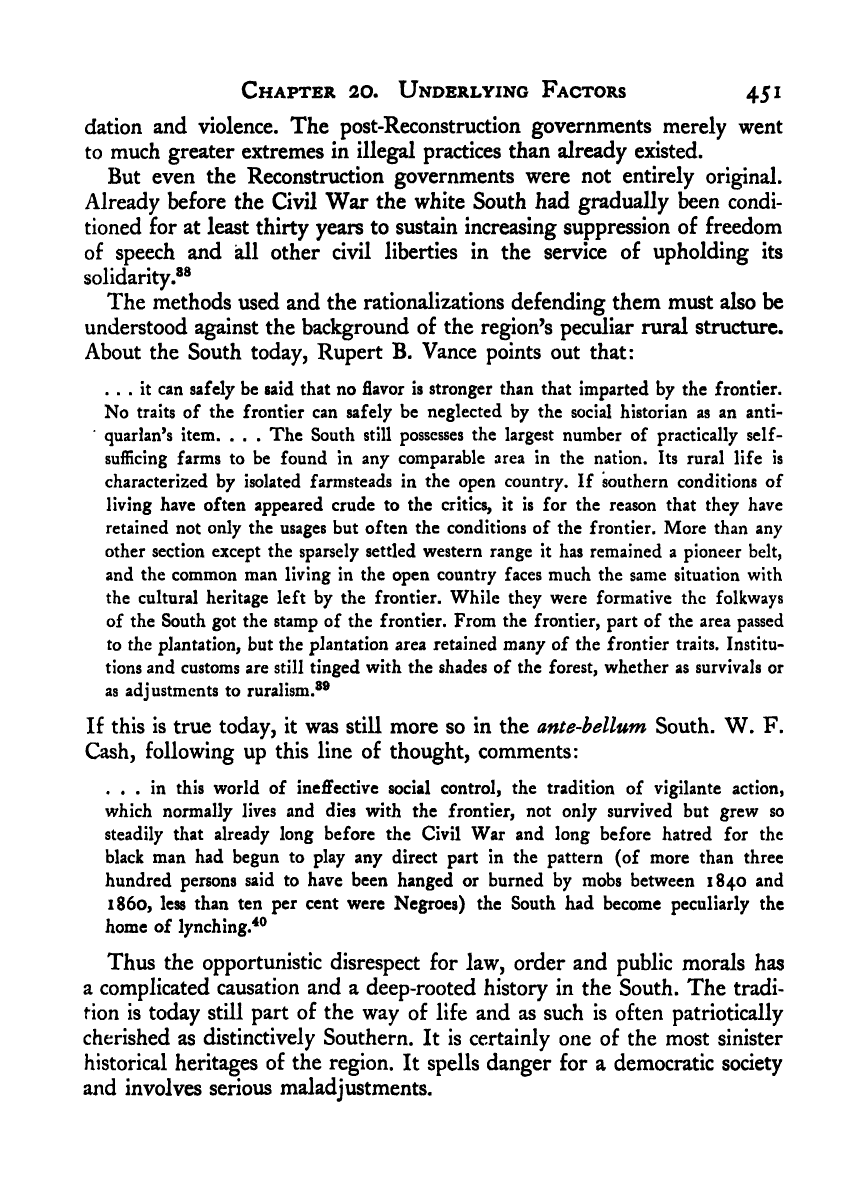Note: Gunnar Myrdal died in 1987, less than 70 years ago. Therefore, this work is protected by copyright, restricting your legal rights to reproduce it. However, you are welcome to view it on screen, as you do now. Read more about copyright.
Full resolution (TIFF) - On this page / på denna sida - V. Politics - 20. Underlying Factors - 7. The Tradition of Illegality

<< prev. page << föreg. sida << >> nästa sida >> next page >>
Below is the raw OCR text
from the above scanned image.
Do you see an error? Proofread the page now!
Här nedan syns maskintolkade texten från faksimilbilden ovan.
Ser du något fel? Korrekturläs sidan nu!
This page has never been proofread. / Denna sida har aldrig korrekturlästs.
Chapter 20. Underlying Factors 451
dation and violence. The post-Reconstruction governments merely went
to much greater extremes in illegal practices than already existed.
But even the Reconstruction governments were not entirely original.
Already before the Civil War the white South had gradually been condi-
tioned for at least thirty years to sustain increasing suppression of freedom
of speech and oil other civil liberties in the service of upholding its
solidarity.*®
The methods used and the rationalizations defending them must also be
understood against the background of the region’s peculiar rural structure.
About the South today, Rupert B. Vance points out that:
... it can safely be said that no flavor is stronger than that imparted by the frontier.
No traits of the frontier can safely be neglected by the social historian as an anti-
quarian’s item. . . . The South still possesses the largest number of practically self-
sufficing farms to be found in any comparable area in the nation. Its rural life is
characterized by isolated farmsteads in the open country. If southern conditions of
living have often appeared crude to the critics, it is for the reason that they have
retained not only the usages but often the conditions of the frontier. More than any
other section except the sparsely settled western range it has remained a pioneer belt,
and the common man living in the open country faces much the same situation with
the cultural heritage left by the frontier. While they were formative the folkways
of the South got the stamp of the frontier. From the frontier, part of the area passed
to the plantation, but the plantation area retained many of the frontier traits. Institu-
tions and customs are still tinged with the shades of the forest, whether as survivals or
as adjustments to ruralism.^®
If this is true today, it was still more so in the ante-bellum South. W. F.
Cash, following up this line of thought, comments:
... in this world of ineffective social control, the tradition of vigilante action,
which normally lives and dies with the frontier, not only survived but grew so
steadily that already long before the Civil War and long before hatred for the
black man had begun to play any direct part in the pattern (of more than three
hundred persons said to have been hanged or burned by mobs between 1840 and
i860, less than ten per cent were Negroes) the South had become peculiarly the
home of lynching.**®
Thus the opportunistic disrespect for law, order and public morals has
a complicated causation and a deep-rooted history in the South. The tradi-
tion is today still part of the way of life and as such is often patriotically
cherished as distinctively Southern. It is certainly one of the most sinister
historical heritages of the region. It spells danger for a democratic society
and involves serious maladjustments.
<< prev. page << föreg. sida << >> nästa sida >> next page >>